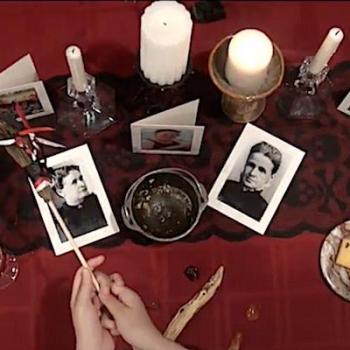 From Episcopal theologian Rev. Carter Heyward’s “Sexual Fidelity” in Touching Our Strength: “…[L]oving involves commitment. We are not automatic lovers of self, others, world, or God. Love does not just happen….”
From Episcopal theologian Rev. Carter Heyward’s “Sexual Fidelity” in Touching Our Strength: “…[L]oving involves commitment. We are not automatic lovers of self, others, world, or God. Love does not just happen….”
Though Rev. Heyward was talking primarily about sexual love and the justice and righteousness that can come forth from the erotic (as Audre Lorde, another lesbian warrior of the spirit and the flesh also wrote), the quotation above makes me think of covenant, as well.
What Is a Covenant? And What Is It for UU’s?
Covenant, then, is a promise that is powerful, solemn, requiring work, and not automatic.
Speaking of covenant, one of the earliest North American documents from which we derive our history is the Cambridge Platform, a Puritan document that became the model for congregational polity. In congregational polity, there is no higher authority than the congregation. The Congregationalists, United Church of Christ adherents, and Unitarian Universalists all derive from this idea of polity.
However, congregations and their congregants dwell together in covenant.
Specifically, as according to a contemporary congregation, Plymouth Congregational Church, “Ours is the tradition of a free church…bound to others by love and faith, not law or required belief statements.”
Who Do We Say We Are?
If you ask the average UU what makes us distinct from most other Christian or Christian-adjacent faiths, they would probably identify the Seven Principles or maybe freedom of theological belief.
In our origins, however, it is covenant that gives rise to the freedom from “creedal test” for belonging to a congregation. And it is not having the creedal test that has encouraged us to have shared values in the Seven Principles, rather than particular beliefs about God or the lack thereof.
In Alice Blair Wesley’s brilliant forward to the Cambridge Platform, she speaks about living together in a covenant of love rather than in compulsion of theology.
A Covenant of Love
 UU’s talk a lot about covenant. Our committees sometimes even begin with the creation of a “covenant,” which could also be described as “ground rules” or “codes of conduct” for meetings.
UU’s talk a lot about covenant. Our committees sometimes even begin with the creation of a “covenant,” which could also be described as “ground rules” or “codes of conduct” for meetings.
Furthermore, the preamble for the Seven Principles—rarely quoted—reads, as follows: “We, the member congregations of the Unitarian Universalist Association, covenant to affirm and promote…”
We, the member congregations…covenant to affirm and promote…
And at the end of the Six Sources, which follow the Seven Principles, we read, “Grateful for the religious pluralism which enriches and ennobles our faith, we are inspired to deepen our understanding and expand our vision. As free congregations we enter into this covenant, promising to one another our mutual trust and support.”
So what are covenants? And are we, as UU’s living up to the ideal of covenant in general or specific?
I have seen covenants made in Heathenry, with libations of mead poured to the gods and in honor of each of those in the covenant. I have seen weddings after wedding, each with some kind of pledge, some kind of mutual and unconditional vow. I am married myself and I have had the experience.
And beyond those, I have been ordained into the Unitarian Universalist ministry. I have made unconditional promises as an ordinand through the congregational polity of All Souls Unitarian. And I have made vows in other initiatory experiences, and given myself over to the process of those initiations.
I keep mentioning unconditional promises, pledges, and vows.
And usually, a covenant is an unconditional and solemn promise between two or more parties.
Not in Committee
Back to the committee meetings.
Agreeing to a set of guidelines for our meetings is not the same thing as a solemn, unconditional promise.
I love that UU polity is based on covenant. I love that our congregations are called to covenant with one another. I love that we are called into what Alice Blair Wesley called a covenant of love.
Sometimes, there is some truth to the off-handed remark that “you can believe whatever you want” in Unitarian Universalism, though there are social prejudices against this or that belief, depending where you are. One place it’s humanism, another Christianity, still another Paganism.
But covenant, now, that is where the rubber hits the road. And do we enter covenants when we join congregations? Do we know what the covenants of our congregations are, within themselves and each to each?
Are we willing to “love beyond belief,” as both Rev. Dr. Parker and Rev. Morales have said? Are we willing for covenantal, vowed, promised love to be more important than the theological beliefs of our congregational neighbors?
Love beyond belief. Answering the call of love beyond belief.
Covenant beyond theology.
As a Wiccan priestess who often feels there is little space for my theology and ritual practice in Unitarian Universalism, I nonetheless love the call of covenant. I love and feel the love of congregants and colleagues all over the world. And that love is precious…precious beyond belief.













